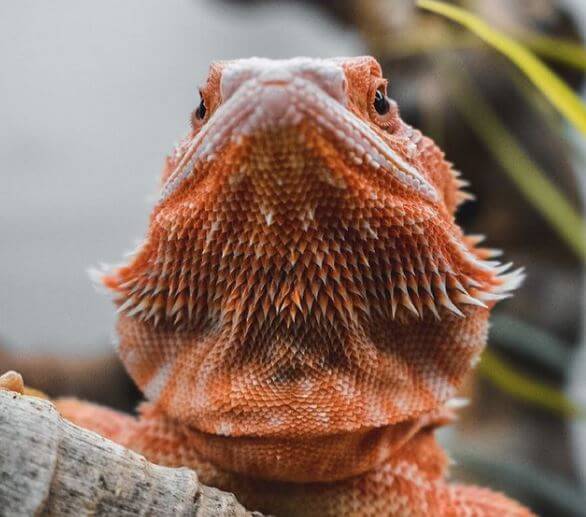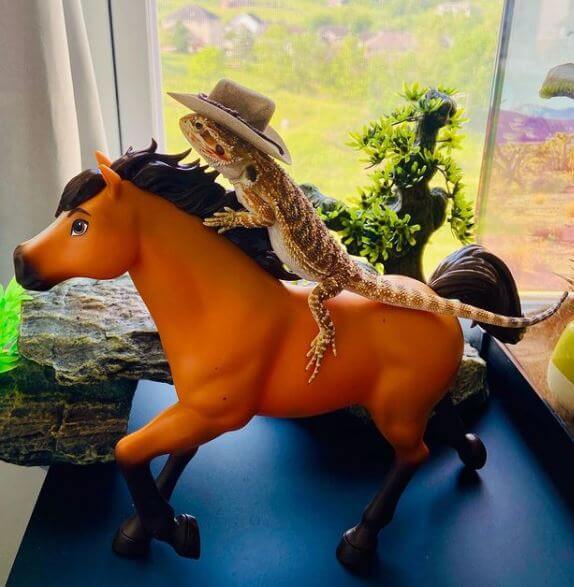How to tell if your bearded dragon likes music?
Many bearded dragon owners don’t know how to tell if their bearded dragon likes music.
Notably, many people have to work and stay at home from day to day because of the pandemic’s influence.
They tend to listen to songs more than usual, and their pets have to hear the sounds as well.
Accordingly, the article below will provide you with some pieces of information to know if your bearded dragon loves music.
Related Posts:
- Bearded Dragon Tank Setup: What Should You Do?
- Can Beardies Eat Honeydew Melon?
- Can Beardies Eat Dill?
- Dunner Beardie vs. Normal Beardie: Facts and Differences
- Reasons Why Your Beardie Turned White and Died
- Can Beardies Get High?
- How Often to Trim Beardie Nails? A Detailed Guide
Do Bearded Dragons Like Music?
A bearded dragon is a clever type of reptile that has an interest in songs.
That is to say, the pet is relatively sensitive and she can hate or like a particular sound.
The dragon can become stressed and startled when she hears noisy sounds.
Besides, her ears are delicate as well.
Accordingly, you should be careful when letting her listen to any sound.

For instance, she prefers soft and calm songs to sudden or loud noises.
If you are not sure which one she loves, you could try to play different types of music near her and notice the reaction.
However, try not to let the sound be too loud or it may lead to a distressed pet in the long term.
What’s more, different bearded dragons have distinctive preferences.
As a result, you have to figure out which sounds your animal enjoys by yourself.
With newcomers, you might want to try television sounds, songs, or even noise from machines.
Bearded Dragon’s Auditory Structure

Before discussing deeper how to tell if your bearded dragon likes music, we need to have a quick look at her auditory structure.
It is noticeable that beardies do not have similar ears as humans. But they still have ears.
There is a hole covered by the tympanic membrane, which is a sheer and thin membrane at the further back of their heads.
The internal ear structure relatively resembles ours.
The sound received is transmitted from the ear fluid to the brand by tiny bones and membranes.
Typically, a normal beardie can hear sounds ranging from 100 to 400 hertz.
Compared to them, we can recognize a broader range of sound, roughly from 20 to 2000 hertz.

As a result, your pet can pick up the sounds of songs without any difficulty.
However, that does not mean all the songs that satisfy humans can do the same with bearded dragons.
By contrast, there are some types she likes and some she does not.
How to Tell If Your Bearded Dragon Likes Music?

There are some signals that you might notice to know if your pet love songs:
1. No Aggressive Behaviors
The very first sign you can see if bearded dragons love music is their gentle behavior.
When you touch or hold them, they do not want to escape or bite. That’s when they love the sounds.
2. Optimistic Body Language
When an animal is content, she often shows positive body language such as wagging tails or making noises.
Bearded dragons are not an exception.
Once you turn on the sound, you find them listening quietly or having slight body vibrations.
That likely means they love the songs.
Furthermore, their eyes often become wider with dilated pupils.
However, each bearded dragon has its language to show its preference.
So it is ideal that you are on the lookout for your pet’s signals in this field.

3. Coming to the Sounds
When bearded dragons hear something they like, they tend to move near the source on their own.
Instead of running, staying still in their old position, hissing, or opening their mouths, they would find the beautiful sounds and enjoy as they do with sunshine.
4. Changing to Brighter and Lighter Colors

Another answer to the question of how to tell if your bearded dragon likes music is to watch its skin’s hue.
She can change into light brown, yellow, or orange color when she is content.
There is a substance called chromatophore in the beardies’ skin.
The pigmented cells allow them to change colors when they are in a good mood or warm condition.
5. Looks Relaxed
Thirdly, there are some common signs to prove that the pet loves the sound.
They often lie down, turn toward the sounds, and close their eyes.
As human beings, they look relaxed and comfortable when enjoying something they like.
What Types of Music Do Bearded Dragons Like?

1. Relaxing Songs
It mostly depends on your beardie’s taste to decide which one she likes.
Despite this, following some research, most bearded dragons like soft sound better like Beethoven or classic genres than harsh and loud ones such as rock or electronic music.
Try some familiar songs like your favorite collection to tell if your bearded dragon likes music.
Remember to turn it on at a low and suitable volume so that it does not affect her hearing ability.
In a nutshell, they might have a positive response to a relaxing and quiet sound.
2. Different Genres

You can think about different genres to know which one your pet love most.
Many users said that they were surprised by some strange kinds of songs their bearded dragons like.
Ironically, some are even big fans of Michael Jackson.
And some dislike any love music, even pop, jazz, country, classical, or blues.
Again, it suggested letting them expose to as many kinds of songs as possible to realize which they love.
Not only does that help them relax, but it also benefits you when you want to train them to do new things, building a solid bond between you.
How Does Music Affect Bearded Dragons?

Songs are one of the most effective and fast ways to influence someone’s emotions.
That is correct with animals, too. The time they hear songs that stimulate them is the time they listen acutely.
Moreover, it is also the bonding period.
For example, when you sit next to a beardie and turn on her favorite songs, she likely thinks it is you who is the pleasant sound.
Consequently, whenever she is next to you, she would think of you as a source of contentment.
Furthermore, when you play songs for your pet, it is also a relaxing time for you.
It is a new and exciting ingredient added to your boring routines as well.
Let’s take a look at this video to know if your bearded dragon likes music and how she enjoys the beautiful sounds:
Besides, many owners talk to their pets while playing songs. It is an opportunity to teach them their name and develop their brain through various training stories.
Beardies are relatively intelligent, so they can gradually realize your voice over time.
How Long Should I Play Music for My Bearded Dragon?
Although playing music for bearded dragons has many benefits, that might backfire if you do too much. So, how long should you spend on the activity?
If it is the first time the reptile is exposed to strange sounds, you are recommended to play for a small amount of time slowly.
About 15 to 20 minutes might be ideal for trying any new things.
Once they show adverse reactions such as escaping from the songs, you should stop or change to another genre.
If the pet enjoys the songs, gradually increase the time, and both of you can have great relaxing moments.
Remember to adjust the sound at a low volume so that she would not startle, distress, or sensorily overload.
How to Know If a Bearded Dragon Dislikes Music?

Another way to tell if a bearded dragon likes music is to check the opposite side. Notice whether she is stressed or not.
If a bearded dragon DISLIKES music, here are the things you will notice about them:
1. Darkening in Color
A significant sign that shows your bearded dragon hates the sounds is their darkening color.
Often, the color changes when she has to shed.
However, if it is not the time of shedding and the hue becomes darker, that might root from the loud sound.
She is annoyed and frustrated with the songs you play.
It is suggested to change the genre or turn it off.
2. Moving Away

Similar to any living feature, bearded dragons stay away from the stuff they lose interest in.
Especially with the sounds around, its hatred can lead to an escape.
3. Strange Marks
When a bearded dragon does not like something, its belly or chin often has some stress marks.
Besides, they could claw at the cage and become lazy, contributing to the stress.
In that case, turn off the songs or change to another genre if possible.
4. Bearding
When a bearded dragon startles because of noises, they could fluff their beard.
They might think the sudden and strange sound is a threat.
As a result, they make themselves scarier and more significant by fluffing, sometimes darkening, their beards.
How to Calm Down a Stressed Bearded Dragon Because of Loud Noises?

When a beardie is forced to hear something they hate, and they can not run away from it, they might distress.
There are some ways you can use to ease the symptom.
1. Stroke Them
Most pet loves being stroked by their owners. Bearded dragons are not the exception, especially when they are stressed.
You can hold them and gently touch their backs or heads.
The act could help them relax and let them know they are safe due to your protection.
However, some bearded dragons do not like being stroked.
In this case, try to put them in their tank and cover it.
Do not try to touch them if you do not want to make them even angrier and more stressed.
2. Turn Off or Change the Music

Of course, the second solution is to change or turn off the sound.
You can try some soft and quiet genres, which often can calm stressed people as well.
3. Give Them a Bath
Finally, you can try to bathe the stressed guys. Many bearded dragons love having a shower.
The method leads to relief and releases destructive emotions.
Furthermore, some owners also feed them or have them a short walk.
Because you have taken care of the pet for a while, you might understand which is best to calm her down.
Try the solution that you think is suitable for her.
Besides, have a look at the bearded dragon after exposing her to the loud noises.

Frequently Asked Questions About Bearded Dragons and Music

1. Does Loud Music Influence Bearded Dragons?
Annoying sounds and strange sounds can negatively affect your beardies, bothering them and making them scared, even stressed.
They often consider the noises as a danger or predator, resulting in an intimidating or defensive position.
2. Are Bearded Dragons Sensitive to Noise?

An intelligent bearded dragon is quite sensitive to loud sounds.
Their ears can pick up sounds ranging from 100 to 400 hertz.
Besides, they often create subtle hissing noises when they have negative emotions.
3. What Sounds Do Bearded Dragons Like to Hear?
Most beardies love soft and calm sounds like Beethoven songs. By contrast, they often hate cumbersome or loud noises.
Unless you want to stress them out, avoid turning on any sound at high volume.
4. Do Television Sounds Bother Bearded Dragons?

According to many tests, bearded dragons do like television shows.
Because they are as curious as any living creature, they can spend hours watching motion images on television channels.
They even show more interest when sitting on owners’ laps and watching television.
5. Do Bearded Dragons Like Quiet?
It depends on your pet’s character. Some bearded dragons like being lazy and alone in their tanks or sunbathing hours quietly outside.
Although, some love cuddling and strange noises. Even so, it is true most beardies like calm songs.
Conclusion
In summary, above are some main pieces of information related to how to tell if your bearded dragon likes music.
If a bearded dragon likes music, they often come near the sounds, showing clear signs and positive body language alike.
There is no aggressive behavior such as hissing noises, darkening colors, appearing strange marks, or escaping.
We hope the article has helped you realize if your bearded dragon love songs in the best way.
Key points on how to tell if your bearded dragon likes music:
Many reptile owners wonder if their bearded dragons have any response to music or sounds. While reptiles, including bearded dragons, don’t hear sounds the way humans or some animals do, there are still some observations that can help you gauge their reactions to music. Here are some tips and insights to consider:
1. No Hearing in the Traditional Sense:
- Bearded dragons do not possess external ears or the inner ear structures necessary for complex auditory perception. Their ability to hear music is limited.
2. Vibrations and Sensations:
- Bearded dragons are sensitive to vibrations and can perceive low-frequency sounds and vibrations through their bodies. They might feel the bass or deep tones in music.
3. No Clear Preference:
- Bearded dragons do not exhibit a clear preference for any specific genre or type of music. They do not have the cognitive capacity to understand or appreciate music in the way humans do.
4. Stress Response:
- Loud or sudden noises, including music, can stress your bearded dragon. Sudden movements or noises might cause them to react defensively or exhibit signs of stress.
5. Individual Variation:
- Some bearded dragons may appear more tolerant of music or certain sounds, while others may react negatively or become agitated.
6. Context Matters:
- The environment and context in which you play music can influence your bearded dragon’s response. For example, playing music softly in the background while maintaining a calm environment may have a different effect compared to playing loud music in a chaotic setting.
7. Observing Behavior:
- Pay attention to your bearded dragon’s behavior when you introduce music. Look for signs of stress, agitation, or heightened activity, which may indicate they are not comfortable with the sound.
8. Stress Reduction Techniques:
- If you want to play music in your bearded dragon’s vicinity, it’s essential to keep the volume low and monitor their behavior. Slowly introduce music and observe their reactions.
9. Preference for Silence:
- Bearded dragons are naturally more comfortable in quiet, calm environments. They may be more at ease when there is no background noise.
10. Use Caution with Speakers: – If you use external speakers or headphones near your bearded dragon’s enclosure, be aware that they might perceive vibrations and react to them.
11. Individual Habituation: – Over time, some bearded dragons might habituate to the presence of music, especially if it is consistently part of their environment. However, it’s crucial to remain attentive to their reactions.
12. Environmental Enrichment: – While music may not be a preference for bearded dragons, providing them with appropriate environmental enrichment, such as climbing structures or basking spots, can enhance their well-being.
In conclusion, bearded dragons don’t possess the same auditory capabilities and preferences as humans or some other animals. While they may perceive vibrations from low-frequency sounds, their response to music is generally limited. It’s important to be attentive to your bearded dragon’s behavior when introducing music and adjust the volume and context to ensure they are comfortable and stress-free. Ultimately, a quiet and calm environment is typically more suitable for these reptiles.
Further Reading:
- Carolina Custom Cages Terrarium Review
- 8 Best Basking Rocks for Beardie: What Is the Best Choice?
- 10 Best Thermometers for Beardie: How to Choose the Best One?
- 5 Best Beardie Lighting Setups for Beardie Lovers
- 9 Best Heat Lamps for Beardie: Natural Habitat Provided


